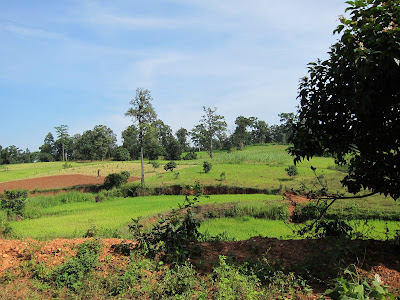Gina writes:
On Saturday, I had the last-minute opportunity to go on a field visit, accompanying an external evaluator to hear about the impact of SPREAD's programs from the perspective of the villagers. The evaluator turned out to be an American with decades of experience living and working in countries all over Africa, Asia, and South America, so it was interesting to hear about his life. I was more interested though, to soak in the experience of being out in the villages for what I knew would be the last time. We leave Koraput on Sunday morning!
Even on the 2+ hour drive to the field area, I had to fight back a tiny tear, thinking about the vistas that I'm leaving behind.
Both villages that we visited had been told that this visit was extremely important to the continuation of SPREAD's programs in the area, so the welcome was extra-special, with garlands of flowers, turmeric and seeds thumbed on our foreheads, and drums and dancing.
When the villagers crowded around to discuss SPREAD's activities, I realized that it was possibly the last time in my life when I'd be able to quietly observe the dynamics of village life in rural India.
In the first village, the women and men were separated into two groups and I sat with the women's group while the evaluator asked questions through a translator. Since the women don't talk much if there's only one group, it was interesting to hear how SPREAD's activities have affected their lives directly. The translations made for slow going though, so I had ample time to take in the small details that I love about village life.
Boys with their arms wrapped around each other, love it!
A small baby enthralled with a tiny goat.
Boys playing on a bike.
We visited two villages where the whole village came together to discuss SPREAD's impact. Between those visits, we went to Kajuripadar, where SPREAD has a field office that I've visited before. There was a women's group meeting taking place there, with women from 10 different villages. The evaluator asked some questions about the operation of the group.
After the translated questions was the most heart-wrenching part of the day. Malti, who is the president of the entire women's group, is a tribal woman who lives in Kajuripadar and has led the group to do amazing things to fight for forest rights, ban liquor, and more. A few months ago she was in the SPREAD office and, somehow, we ended up really connecting. I was just using my basic Oriya and she was just laughing at my pronunciation, but it was the first time that I'd had the opportunity to spend time one-on-one with a tribal person without them feeling extremely shy and me feeling extremely awkward. It's hard to explain, but her caring and lighthearted nature came across in that hour sitting outside the office. I saw her again a few days later and we made tentative plans for me to visit the village again, since SPREAD has a field office there. With winding up work at SPREAD, however, there wasn't time. So I was ecstatic to know that we'd be dropping in to Kajuripadar.
After the meeting, I asked if I could have a picture taken with her. She happily agreed.
Tribal women are small!
Then the rest of the women's group wanted a picture with me, which made me so happy. I love this picture!
I wish I'd met Malti earlier in my time here in Koraput, but even the small connection that we had is something I will always cherish. Seeing her again and sitting in the midst of these amazing women really did make me catch my breath, because I know that the closest I will ever come to being "one of them" is right now. I of course will always be an outsider even if I visit later in life, but after two years of practicing Oriya, making field visits, staying in their villages, and building relationships with the SPREAD staff so that they know they can trust me, I feel comfortable sitting in a village with these people and they feel more at ease with me.
People have been asking us a lot lately when we'll come back to Koraput. The answer that we've taken to giving is, "Sure, in 5 or 10 years, we'll come and we'll bring our children." Whether it's the response that we've settled on for ease of answering or it's a true prediction, only time will tell.
Labels: Work















